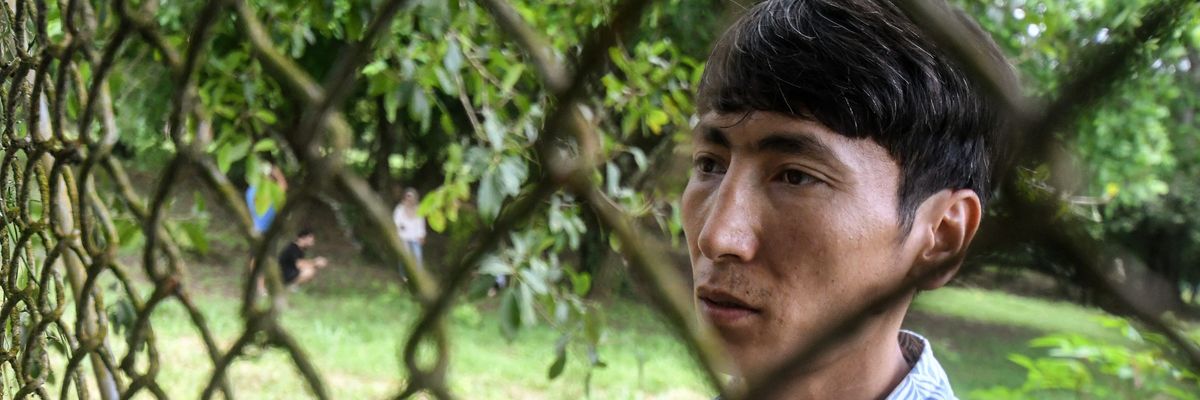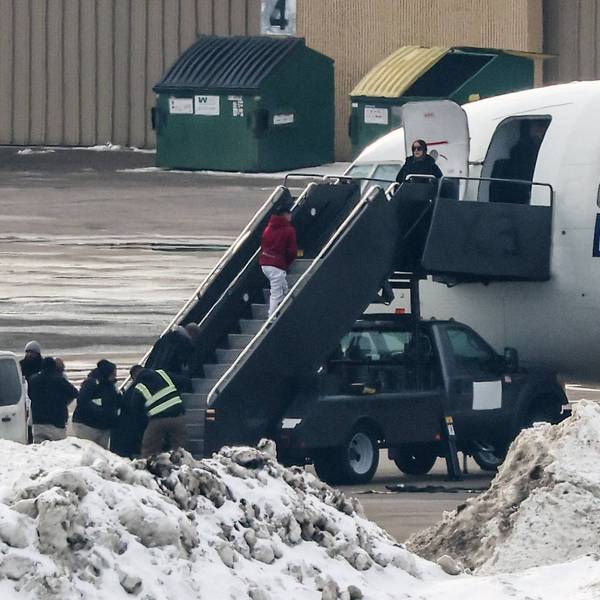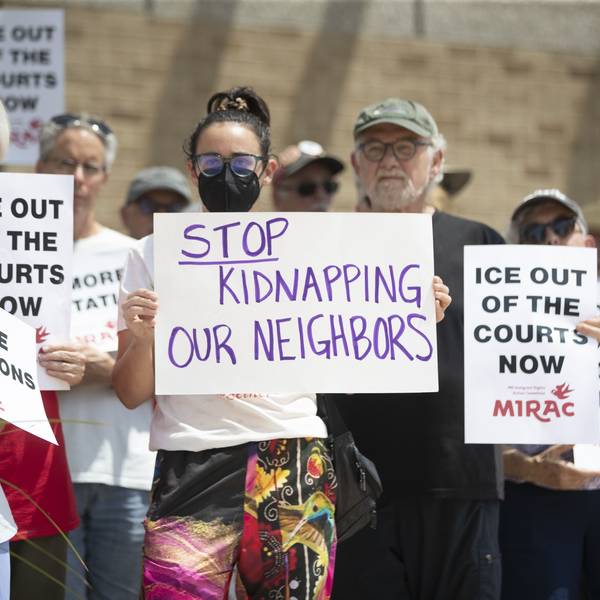
Afghan Mohammad Saber Asadi speaks during an AFP interview at the Temporary Care Center for Migrants in Puntarenas, Costa Rica on March 23, 2025.
Human Rights Group Blasts Trump Admin for Deporting Hundreds of Non-Costa Ricans to Costa Rica
"These summary expulsions violated the right to seek asylum and the right to a fair hearing and other due process protections prior to deportation," according to a report from Human Rights Watch.
Dozens of non-Costa Rican nationals who were deported to Costa Rica by the Trump administration in February say they did not receive an asylum screening interview before being expelled, according to a report released by Human Rights Watch on Thursday.
The report alleges that the U.S. government did not follow the "minimal, if deficient" protections around the right to seek asylum and the right not be returned to harm, and kept those expelled in "inhumane conditions" while they were detained in the United States.
The report explores one instance of the Trump administration expelling migrants to a country besides their country of origin, a tactic the administration has repeatedly reached for as part of its immigration crackdown.
In the report, Human Rights Watch calls on the U.S. government to stop expelling or transferring noncitizens to third countries.
In February, Costa Rica received two flights with 200 deportees, including 81 children, from the U.S. as part of an expulsion agreement, the details of which have not been disclosed, according to the report.
"I genuinely think the [U.S.] authorities treated us so poorly, held us in those horrendous, degrading conditions, to force us to sign those volunteer deportation papers as fast as possible and maybe also to tell others, so that people would be scared to seek asylum, to come to the U.S.," said one 33-year old woman from Russia who was deported to Costa Rica.
In some cases, U.S. officials separated families when carrying out the expulsions to Costa Rica. In one instance, U.S. Customs and Border Protection (CBP) sent an Iranian man and his daughter to Costa Rica but kept the girl's stepmother in the U.S., according to the report.
Human Rights Watch interviewed dozens of the migrants sent to Costa Rica and heard stories from those people that, "if true, indicate that people fled persecution based on factors such as ethnicity, religion, gender, family associations, and political opinion."
U.S. law guarantees the right to apply for asylum, and while many of those who spoke to Human Rights Watch appeared to have strong claims, only two out of 36 people interviewed by the group had a screening interview for asylum in the U.S. before being deported to Costa Rica. Almost all of the 36 people said U.S. officials ignored their repeated attempts to request asylum, per the report.
Some of the people whom Human Rights Watch spoke to had been in Mexico and made appointments to present themselves at a U.S. point of entry to seek asylum through an application developed by CBP, CBP One. When the Trump administration canceled all pending appointments through CBP One, some went to U.S. checkpoints to request asylum, while others crossed irregularly, such as by climbing over or through gaps in the border wall and then sought out or "waited for" U.S. border agents, according to the report.
Once apprehended, those who spoke to Human Rights Watch reported conditions such as freezing temperatures, little access to showers, and families being separated while being held at immigration processing centers.
"In every case documented by Human Rights Watch, DHS expelled people to Costa Rica without following the deportation processes set forth in U.S. law—not even the streamlined process known as 'expedited removal,'" according to the report, referencing the U.S. Department of Homeland Security. "Instead, acting under the purported authority of a presidential proclamation, DHS agents sent people to Costa Rica, a country of which they are not nationals and to which they had no intention of traveling."
"These summary expulsions violated the right to seek asylum and the right to a fair hearing and other due process protections prior to deportation, in violation of statutory and constitutional guarantees and international treaties ratified by the United States," the report states.
The people interviewed by Human Rights Watch reported that they were not given the necessary documents required to be issued during a deportation proceeding. They reported being taken to an airfield and given no explanation until they were about to board the plane to Costa Rica.
Human Rights Watch says those deported were then initially subject to arbitrary detention in Costa Rica, and in practice they were not allowed to freely leave the center where they were being held except under certain circumstances. The Costa Rican government says they were not "detained" and indicated instead that freedom of movement was limited for their own safety, according to the report.
In April, officials in Costa Rica told them they could obtain a humanitarian permit that would give them 90 days to apply for asylum in Costa Rica or leave the country.
An Urgent Message From Our Co-Founder
Dear Common Dreams reader, The U.S. is on a fast track to authoritarianism like nothing I've ever seen. Meanwhile, corporate news outlets are utterly capitulating to Trump, twisting their coverage to avoid drawing his ire while lining up to stuff cash in his pockets. That's why I believe that Common Dreams is doing the best and most consequential reporting that we've ever done. Our small but mighty team is a progressive reporting powerhouse, covering the news every day that the corporate media never will. Our mission has always been simple: To inform. To inspire. And to ignite change for the common good. Now here's the key piece that I want all our readers to understand: None of this would be possible without your financial support. That's not just some fundraising cliche. It's the absolute and literal truth. We don't accept corporate advertising and never will. We don't have a paywall because we don't think people should be blocked from critical news based on their ability to pay. Everything we do is funded by the donations of readers like you. Will you donate now to help power the nonprofit, independent reporting of Common Dreams? Thank you for being a vital member of our community. Together, we can keep independent journalism alive when it’s needed most. - Craig Brown, Co-founder |
Dozens of non-Costa Rican nationals who were deported to Costa Rica by the Trump administration in February say they did not receive an asylum screening interview before being expelled, according to a report released by Human Rights Watch on Thursday.
The report alleges that the U.S. government did not follow the "minimal, if deficient" protections around the right to seek asylum and the right not be returned to harm, and kept those expelled in "inhumane conditions" while they were detained in the United States.
The report explores one instance of the Trump administration expelling migrants to a country besides their country of origin, a tactic the administration has repeatedly reached for as part of its immigration crackdown.
In the report, Human Rights Watch calls on the U.S. government to stop expelling or transferring noncitizens to third countries.
In February, Costa Rica received two flights with 200 deportees, including 81 children, from the U.S. as part of an expulsion agreement, the details of which have not been disclosed, according to the report.
"I genuinely think the [U.S.] authorities treated us so poorly, held us in those horrendous, degrading conditions, to force us to sign those volunteer deportation papers as fast as possible and maybe also to tell others, so that people would be scared to seek asylum, to come to the U.S.," said one 33-year old woman from Russia who was deported to Costa Rica.
In some cases, U.S. officials separated families when carrying out the expulsions to Costa Rica. In one instance, U.S. Customs and Border Protection (CBP) sent an Iranian man and his daughter to Costa Rica but kept the girl's stepmother in the U.S., according to the report.
Human Rights Watch interviewed dozens of the migrants sent to Costa Rica and heard stories from those people that, "if true, indicate that people fled persecution based on factors such as ethnicity, religion, gender, family associations, and political opinion."
U.S. law guarantees the right to apply for asylum, and while many of those who spoke to Human Rights Watch appeared to have strong claims, only two out of 36 people interviewed by the group had a screening interview for asylum in the U.S. before being deported to Costa Rica. Almost all of the 36 people said U.S. officials ignored their repeated attempts to request asylum, per the report.
Some of the people whom Human Rights Watch spoke to had been in Mexico and made appointments to present themselves at a U.S. point of entry to seek asylum through an application developed by CBP, CBP One. When the Trump administration canceled all pending appointments through CBP One, some went to U.S. checkpoints to request asylum, while others crossed irregularly, such as by climbing over or through gaps in the border wall and then sought out or "waited for" U.S. border agents, according to the report.
Once apprehended, those who spoke to Human Rights Watch reported conditions such as freezing temperatures, little access to showers, and families being separated while being held at immigration processing centers.
"In every case documented by Human Rights Watch, DHS expelled people to Costa Rica without following the deportation processes set forth in U.S. law—not even the streamlined process known as 'expedited removal,'" according to the report, referencing the U.S. Department of Homeland Security. "Instead, acting under the purported authority of a presidential proclamation, DHS agents sent people to Costa Rica, a country of which they are not nationals and to which they had no intention of traveling."
"These summary expulsions violated the right to seek asylum and the right to a fair hearing and other due process protections prior to deportation, in violation of statutory and constitutional guarantees and international treaties ratified by the United States," the report states.
The people interviewed by Human Rights Watch reported that they were not given the necessary documents required to be issued during a deportation proceeding. They reported being taken to an airfield and given no explanation until they were about to board the plane to Costa Rica.
Human Rights Watch says those deported were then initially subject to arbitrary detention in Costa Rica, and in practice they were not allowed to freely leave the center where they were being held except under certain circumstances. The Costa Rican government says they were not "detained" and indicated instead that freedom of movement was limited for their own safety, according to the report.
In April, officials in Costa Rica told them they could obtain a humanitarian permit that would give them 90 days to apply for asylum in Costa Rica or leave the country.
- Opinion | Watching The Trump Administration Violate Basic Human Rights with Impunity | Common Dreams ›
- Leaked Drafts Show Trump Administration Scrubbing Out Human Rights Violations of Favored Nations | Common Dreams ›
Dozens of non-Costa Rican nationals who were deported to Costa Rica by the Trump administration in February say they did not receive an asylum screening interview before being expelled, according to a report released by Human Rights Watch on Thursday.
The report alleges that the U.S. government did not follow the "minimal, if deficient" protections around the right to seek asylum and the right not be returned to harm, and kept those expelled in "inhumane conditions" while they were detained in the United States.
The report explores one instance of the Trump administration expelling migrants to a country besides their country of origin, a tactic the administration has repeatedly reached for as part of its immigration crackdown.
In the report, Human Rights Watch calls on the U.S. government to stop expelling or transferring noncitizens to third countries.
In February, Costa Rica received two flights with 200 deportees, including 81 children, from the U.S. as part of an expulsion agreement, the details of which have not been disclosed, according to the report.
"I genuinely think the [U.S.] authorities treated us so poorly, held us in those horrendous, degrading conditions, to force us to sign those volunteer deportation papers as fast as possible and maybe also to tell others, so that people would be scared to seek asylum, to come to the U.S.," said one 33-year old woman from Russia who was deported to Costa Rica.
In some cases, U.S. officials separated families when carrying out the expulsions to Costa Rica. In one instance, U.S. Customs and Border Protection (CBP) sent an Iranian man and his daughter to Costa Rica but kept the girl's stepmother in the U.S., according to the report.
Human Rights Watch interviewed dozens of the migrants sent to Costa Rica and heard stories from those people that, "if true, indicate that people fled persecution based on factors such as ethnicity, religion, gender, family associations, and political opinion."
U.S. law guarantees the right to apply for asylum, and while many of those who spoke to Human Rights Watch appeared to have strong claims, only two out of 36 people interviewed by the group had a screening interview for asylum in the U.S. before being deported to Costa Rica. Almost all of the 36 people said U.S. officials ignored their repeated attempts to request asylum, per the report.
Some of the people whom Human Rights Watch spoke to had been in Mexico and made appointments to present themselves at a U.S. point of entry to seek asylum through an application developed by CBP, CBP One. When the Trump administration canceled all pending appointments through CBP One, some went to U.S. checkpoints to request asylum, while others crossed irregularly, such as by climbing over or through gaps in the border wall and then sought out or "waited for" U.S. border agents, according to the report.
Once apprehended, those who spoke to Human Rights Watch reported conditions such as freezing temperatures, little access to showers, and families being separated while being held at immigration processing centers.
"In every case documented by Human Rights Watch, DHS expelled people to Costa Rica without following the deportation processes set forth in U.S. law—not even the streamlined process known as 'expedited removal,'" according to the report, referencing the U.S. Department of Homeland Security. "Instead, acting under the purported authority of a presidential proclamation, DHS agents sent people to Costa Rica, a country of which they are not nationals and to which they had no intention of traveling."
"These summary expulsions violated the right to seek asylum and the right to a fair hearing and other due process protections prior to deportation, in violation of statutory and constitutional guarantees and international treaties ratified by the United States," the report states.
The people interviewed by Human Rights Watch reported that they were not given the necessary documents required to be issued during a deportation proceeding. They reported being taken to an airfield and given no explanation until they were about to board the plane to Costa Rica.
Human Rights Watch says those deported were then initially subject to arbitrary detention in Costa Rica, and in practice they were not allowed to freely leave the center where they were being held except under certain circumstances. The Costa Rican government says they were not "detained" and indicated instead that freedom of movement was limited for their own safety, according to the report.
In April, officials in Costa Rica told them they could obtain a humanitarian permit that would give them 90 days to apply for asylum in Costa Rica or leave the country.
- Opinion | Watching The Trump Administration Violate Basic Human Rights with Impunity | Common Dreams ›
- Leaked Drafts Show Trump Administration Scrubbing Out Human Rights Violations of Favored Nations | Common Dreams ›

